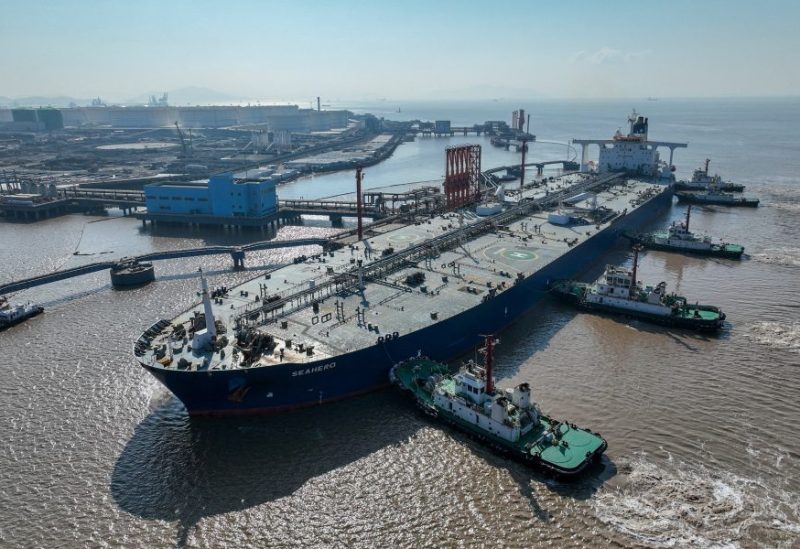
An aerial view shows a crude oil tanker at an oil terminal off Waidiao island in Zhoushan, Zhejiang province, China January 4, 2023. China Daily via REUTERS
Oil prices extended declines on Monday, pressured by investor scepticism over the latest OPEC+ decision on supply cuts and uncertainty surrounding global fuel demand, though the risk of supply disruptions from the Middle East conflict limited losses.
Monday’s fall adds to a 2% decline last week after the supply cuts announced on Thursday by the Organization of the Petroleum Exporting Countries (OPEC) and allies including Russia, together known as OPEC+.
Brent crude futures were down 55 cents, or 0.72%, at $78.33 a barrel by 11:22 CST (1722 GMT). U.S. West Texas Intermediate crude futures fell 70 cents, or 0.93%, to $73.34.
“They’re probably catching their breath after last week’s OPEC+ meeting,” Andrew Lipow, president of Lipow Oil Associates, said of crude traders on Monday. “The market has decided {OPEC production plans) are not going to have that much of an impact. It’s more style over substance.”
OPEC+ announced production cuts that are voluntary in nature, raising doubts about whether or not producers would fully implement them. Investors were also unsure about how the cuts would be measured.
“Crude seems to be under continued pressure from the OPEC+ decision,” said Vandana Hari, founder of oil market analysis provider Vanda Insights.
Expectations of lower demand were also pressuring prices.
“The OPEC+ ‘deal’ last week was unconvincing to say the least,” said Craig Erlam, analyst at brokerage OANDA. “And with markets seemingly anticipating more of an economic slowdown next year, the announcement simply doesn’t go far enough.”
Surveys on Friday showed global manufacturing activity remained weak in November on soft demand, with euro zone factory activity contracting, while there were mixed signs on the strength of China’s economy.
Geopolitical considerations were back in focus as fighting resumed in Gaza, lending some support to prices. Three commercial vessels came under attack in international waters in the southern Red Sea, the U.S. military said on Sunday.
Elsewhere, Western countries have stepped up efforts to enforce the $60 a barrel price cap on seaborne shipments of Russian oil imposed to punish Moscow for its war in Ukraine.
Washington on Friday imposed additional sanctions on three entities and three oil tankers.